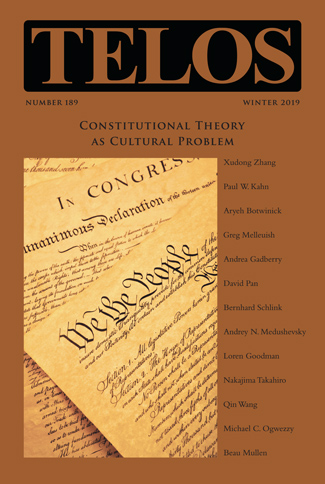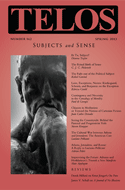In today’s episode of the Telos Press Podcast, Camelia Raghinaru talks with Loren Goodman about his article “Poetic Impositions: Japanese–U.S. Constitutional Problems of Peace and Tranquility,” from Telos 189 (Winter 2019). An excerpt of the article appears here. If your university has an online subscription to Telos, you can read the full article at the Telos Online website. For non-subscribers, learn how your university can begin a subscription to Telos at our library recommendation page. Purchase a print copy of Telos 189 in our online store.
|
Telos 189 (Winter 2019), a special issue on Constitutional Theory as Cultural Problem, edited by Xudong Zhang and David Pan, is now available for purchase in our store. Individual subscriptions to Telos are also available in both print and online formats.
The appointment of the Minister of Industry, the so-called “technocrat” Mehdi Jomaa, to form a caretaker government in Tunisia on the eve of the revolution’s third anniversary, threw into stark relief the country’s complex struggle for democracy following the January 14 revolution. The announcement came in the wake of the Islamist party Ennahdha’s sudden renunciation of the Prime Minister’s office in September, ostensibly a sign of cooperation in the face of mounting criticism surrounding the government’s failure to investigate the assassinations of two political opposition figures. A number of Western media outlets, including the New York Times, quickly absorbed the narrative advanced by Ennahdha’s leader and spiritual guide Rachid al-Ghannouchi referring to the appointment of Jomaa as a “yielding of power.” This narrative of concession, however, elides the fact that neither of the Parliament’s largest secular opposition parties supported the vote to appoint Jomaa, or, for that matter, that the vote failed to achieve a majority. Faced with mounting criticism, Ennahdha’s spokesman denied reports in Le Monde from the previous day that the appointment had been directed by lobbying efforts from the U.S. Department of State and the E.U.[1] In other words, Ennahdha leaders defended the appointment as a victory as much as they sold it as a concession. The former lends itself to the long-standing critique on the part of secular pundits within Tunisia that Ennahdha has been playing a long game and is determined to alter the secular nature of the State. The latter suggests that the Islamist party is representative of a democratic majority and envisions a path of moderate conservative governance along the lines of the AKP in Turkey. Luciano Pellicani ‘s “The Cultural War between Athens and Jerusalem: The American Case” appears in Telos 162 (Spring 2013). Read the full version online at the Telos Online website, or purchase a print copy of the issue in our store. Today concludes the series of five blog entries aimed at understanding the current political crisis in the European Union through a Schmittian lens. (For the previous posts, see part 1, part 2, part 3, and part 4.) In this post, Michael Marder asks what it would take for the EU to overcome the crisis. The answer, he argues, is nothing less than the EU constituting itself anew, by way of contesting the meaning of the European political subjectivity. Toward a New Self-Constitution of Europe? What remains, within the framework the European Union, is the constitution in a relative sense, dissolved “into a multitude of individual, formally equivalent constitutional laws.”[1] We face an expression without anything to express, devoid if not of meaning then of a connection to the sources of meaningfulness. The relegation of constitutional unity to the background and its substitution with constitutional details suits well that institutional arrangement where unity does not actually exist, that is, one where it is not bound to the texture of political existence. The multitude of EU laws is groundless in a different sense from the groundlessness of the absolute concept of the constitution, which is rooted in actual existence and, therefore, self-grounded: “Every existing political unity has its value and its ‘right to existence’ not in the rightness or usefulness of norms, but rather in its existence.”[2] Assuming that this necessary precondition for constitutionality has not been set in place, the main challenge Europe is facing, one that is more fundamental than solving the financial and political crises it is embroiled in, is to attain its political existence, to constitute itself. This is the fourth in a series of five blog entries aimed at understanding the current political crisis in the European Union through a Schmittian lens. (For the previous posts, see part 1, part 2, and part 3.) The hollowness of the EU’s political institutions implies that they are not lively enough to re-constitute themselves so as to cope with new challenges and changing circumstances. That is why the current crisis strikes so deeply at the foundations of the EU and threatens to overwhelm the order it had attempted to institute without taking the question of sovereignty into account. Europe’s Dynamic De-Constitution In line with the existential provenance of the form of constitution, such a form cannot be conceived as a static thing but, rather, as a process of formation, or, in Schmitt’s words, “the principle of the dynamic emergence of political unity, of the process of constantly renewed formation and emergence of this unity from a fundamental or ultimately effective power and energy.”[1] It would appear that this dynamic concept of constitution holds a redemptive hope for the EU, which prides itself on being a work-in-progress oriented by the still incomplete tasks of European integration. But this dynamism is just that—a mere appearance. First, as a “union,” the European Union postulates the apriori conditions of unity, those pre-established guidelines with which candidate states must comply and which do not dynamically (organically) emerge in the heat of political life. An incomplete project of unification, it adds on new members in the manner of mineral accretion, as extraneous layers superimposed on an equally dead core. Second, the inherent limits of unity are determined by the limits of the EU competence that acknowledge an irreducible fragmentation of political existence, as diverse as the distinct constitutional traditions of member states make it out to be. The feigned dynamism of the Union’s expansion occludes from view the stagnation of its ossified form, drained of “effective power and energy.” |
||||
|
Telos Press Publishing · PO Box 811 · Candor, NY 13743 · Phone: 212-228-6479 Privacy Policy · Data Protection Copyright © 2025 Telos Press Publishing · All Rights Reserved |
||||

 Despite what Harold Berman claimed, the writers of the American Constitution were not inspired by strong religious convictions. On the contrary, as typical men of the Enlightenment they were severe critics of Christianity, considering it an obscurantist and intolerant tradition in all its versions. Hence their cultural battle to achieve the institutionalization of what Thomas Jefferson called “the wall of separation between State and Church” that would guarantee the greatest religious freedom. A freedom that was periodically threatened by fundamentalist movements which, in the name of Jerusalem, sought—and still seek—to establish a confessional state governed by the truth revealed in the Bible whereas the founding fathers hoped that “what Athens was in miniature, America will be in magnitude.” It is not true that America was born modern and progressive, as Ernest Gellner has maintained. It became so through the cultural war between Athens and Jerusalem that began in the eighteenth century and is still in progress.
Despite what Harold Berman claimed, the writers of the American Constitution were not inspired by strong religious convictions. On the contrary, as typical men of the Enlightenment they were severe critics of Christianity, considering it an obscurantist and intolerant tradition in all its versions. Hence their cultural battle to achieve the institutionalization of what Thomas Jefferson called “the wall of separation between State and Church” that would guarantee the greatest religious freedom. A freedom that was periodically threatened by fundamentalist movements which, in the name of Jerusalem, sought—and still seek—to establish a confessional state governed by the truth revealed in the Bible whereas the founding fathers hoped that “what Athens was in miniature, America will be in magnitude.” It is not true that America was born modern and progressive, as Ernest Gellner has maintained. It became so through the cultural war between Athens and Jerusalem that began in the eighteenth century and is still in progress. 

